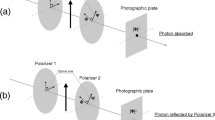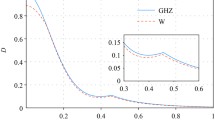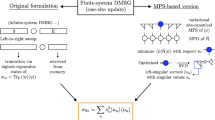Abstract
Measurement-device-independent quantum key distribution (MDI-QKD) is a promising protocol for realizing long-distance secret keys sharing. However, its key rate is relatively low when the finite-size effect is taken into account. In this paper, we consider statistical fluctuation analysis for the three-intensity decoy-state MDI-QKD system based on the recent work (Zhang et al. in Phys Rev A 95:012333, 2017) and further compare its performance with that of applying the Gaussian approximation technique and the Chernoff bound method. The numerical simulations demonstrate that the new method has apparent enhancement both in key generation rate and transmission distance than using Chernoff bound method. Meanwhile, the present work still shows much higher security than Gaussian approximation analysis.



Similar content being viewed by others
References
Bennett, C.H., Brassard, G.: Quantum cryptography: public key distribution and coin tossing. Theor. Comput. Sci. 560, 7–11 (2014)
Ekert, A.K.: Quantum cryptography based on Bells theorem. Phys. Rev. Lett. 67, 661–663 (1999)
Lo, H.K., Chau, H.F.: Unconditional security of quantum key distribution over arbitrarily long distances. Science 283, 2050–2056 (1999)
Shor, P.W., Preskill, J.: Simple proof of security of the BB84 quantum key distribution protocol. Phys. Rev. Lett. 85, 441–444 (2000)
Mayers, D.: Unconditional security in quantum cryptography. J. ACM 48, 351–406 (2001)
Gottesman, D., Lo, H.K., Lutkenhaus, N., Preskill, J.: Security of quantum key distribution with imperfect devices. Quantum Inf. Comput. 4, 325–360 (2004)
Brassard, G., Lutkenhaus, N., Mor, T., et al.: Limitations on practical quantum cryptography. Phys. Rev. Lett. 85, 1330–1333 (2000)
Lutkenhaus, N.: Security against individual attacks for realistic quantum key distribution. Phys. Rev. A 5, 052304 (2000)
Fung, C.H.F., Qi, B., Tamaki, K., Lo, H.K.: Phase-remapping attack in practical quantum-key-distribution systems. Phys. Rev. A 75, 032314 (2007)
Xu, F.H., Qi, B., Lo, H.K.: Experimental demonstration of phase-remapping attack in a practical quantum key distribution system. New J. Phys. 12, 113026 (2010)
Qi, B., Fung, C.H.F., Lo, H.K., et al.: Time-shift attack in practical quantum cryptosystems. Quantum Inf. Comput. 7, 73–82 (2007)
Zhao, Y., Fung, C.H.F., Qi, B.: Quantum hacking: experimental demonstration of time-shift attack against practical quantum-key-distribution systems. Phys. Rev. A 78, 042333 (2008)
Makarov, V., Hjelme, D.R.: Faked states attack on quantum cryptosystems. J. Mod. Opt. 52, 691–705 (2005)
Makarov, V., Anisimov, A., Skaar, J.: Effects of detector efficiency mismatch on security of quantum cryptosystems. Phys. Rev. A 74, 022313 (2006)
Hwang, W.Y.: Quantum key distribution with high loss: toward global secure communication. Phys. Rev. Lett. 91, 057901 (2003)
Wang, X.B.: Beating the photon-number-splitting attack in practical quantum cryptography. Phys. Rev. Lett. 94, 230503 (2005)
Lo, H.K., Ma, X.F., Chen, K.: Decoy state quantum key distribution. Phys. Rev. Lett. 94, 230504 (2005)
Acin, A., Massar, S., Pironio, S.: Efficient quantum key distribution secure against no-signalling eavesdroppers. New J. Phys. 8, 126 (2006)
Acin, A., Brunner, N., Gisin, N., et al.: Device-independent security of quantum cryptography against collective attacks. Phys. Rev. Lett. 98, 230501 (2007)
Lo, H.K., Curty, M., Qi, B.: Measurement-device-independent quantum key distribution. Phys. Rev. Lett. 108, 130503 (2012)
Wang, X.B.: Three-intensity decoy-state method for device-independent quantum key distribution with basis-dependent errors. Phys. Rev. A 87, 012320 (2013)
Wang, Q., Wang, X.B.: Efficient implementation of the decoy-state measurement-device-independent quantum key distribution with heralded single-photon sources. Phys. Rev. A 88, 052332 (2013)
Tamaki, K., Lo, H.K., Fung, C.H.F., et al.: Phase encoding schemes for measurement-device-independent quantum key distribution with basis-dependent flaw. Phys. Rev. A 85, 42307 (2012)
Ferreira da Silva, T., Vitoreti, D., Xavier, G.B., et al.: Proof-of-principle demonstration of measurement-device-independent quantum key distribution using polarization qubits. Phys. Rev. A 88, 052303 (2013)
Chen, D., Zhao, S.H., Shi, L., Liu, Y.: Measurement-device-independent quantum key distribution with pairs of vector vortex beams. Phys. Rev. A 93, 032320 (2015)
Liu, Y., Chen, T.Y., Wang, L.J.: Experimental measurement-device-independent quantum key distribution. Phys. Rev. Lett. 111, 130502 (2013)
Wang, C., Song, X.T., Yin, Z.Q.: Phase-reference-free experiment of measurement-device-independent quantum key distribution. Phys. Rev. Lett. 115, 160502 (2015)
Yin, H.L., Chen, T.Y., Yu, Z.W.: Measurement-device-independent quantum key distribution over a 404 km optical fiber. Phys. Rev. Lett. 117, 190501 (2016)
Wang, C., Yin, Z.Q., Wang, S., et al.: Measurement-device-independent quantum key distribution robust against environmental disturbances. Optica 4, 1016 (2017)
Zhou, Y.H., Yu, Z.W., Wang, X.B.: Making the decoy-state measurement-device-independent quantum key distribution practically useful. Phys. Rev. A 93, 042324 (2016)
Wei, J.H., Dai, H.Y., Zhang, M.: Two efficient schemes for probabilistic remote state preparation and the combination of both schemes. Quantum Inf. Process. 13, 2115–2125 (2014)
Wei, J.H., Shi, L., et al.: Remote preparation of an arbitrary multi-qubit state via two-qubit entangled states. Quantum Inf. Process. 16, 2601–2612 (2016)
Lim, C.C.W., Curty, M., Walenta, N., Xu, F.H., Zbinden, H.: Concise security bounds for practical decoy-state quantum key distribution. Phys. Rev. A 89, 022307 (2014)
Curty, M., Xu, F.H., Cui, W., et al.: Finite-key analysis for measurement-device-independent quantum key distribution. Nat. Commun. 5, 3732 (2014)
Yu, Z.W., Zhou, Y.H., Wang, X.B.: Statistical fluctuation analysis for measurement-device-independent quantum key distribution with three-intensity decoy-state method. Phys. Rev. A 91, 032318 (2015)
Zhang, Z., Zhao, Q., Razavi, M., et al.: Improved key-rate bounds for practical decoy-state quantum-key-distribution systems. Phys. Rev. A 95, 012333 (2017)
Ma, X.F., Fung, C.H.F., Razavi, M.: Statistical fluctuation analysis for measurement-device-independent quantum key distribution. Phys. Rev. A 86, 052305 (2012)
Chernoff, H.: A measure of asymptotic efficiency for tests of a hypothesis based on the sum of observations. Ann. Math. Stat. 23, 493 (1952)
Jiang, C., Yu, Z.W., Wang, X.B.: Measurement-device-independent quantum key distribution with source state errors and statistical fluctuation. Phys. Rev. A 95, 032325 (2017)
Wang, Q., Wang, X.B.: Simulating of the measurement-device independent quantum key distribution with phase randomized general sources. Sci. Rep. 4, 4612 (2014)
Xu, F.H., Xu, H., Lo, H.K.: Protocol choice and parameter optimization in decoy-state measurement-device-independent quantum key distribution. Phys. Rev. A 89, 052333 (2014)
Acknowledgements
We appreciate enlightened discussion and kind assistance in mathematical simulations from Mr. X. Y. Zhou and C. H. Zhang. We also gratefully acknowledge the financial support from the National Key Research and Development Program of China through Grant No. 2017YFA0304100, the National Natural Science Foundation of China through Grants Nos. 61475197, 61590932, 11774180, 61705110, the Natural Science Foundation of the Jiangsu Higher Education Institutions through Grant Nos. 15KJA120002, 17KJB140016, the Outstanding Youth Project of Jiangsu Province through Grant No. BK20150039 and the Natural Science Foundation of Jiangsu Province through Grant No. BK20170902.
Author information
Authors and Affiliations
Corresponding author
Rights and permissions
About this article
Cite this article
Ding, HJ., Mao, CC., Zhang, CM. et al. Improved statistical fluctuation analysis for measurement-device-independent quantum key distribution. Quantum Inf Process 17, 332 (2018). https://doi.org/10.1007/s11128-018-2026-3
Received:
Accepted:
Published:
DOI: https://doi.org/10.1007/s11128-018-2026-3




